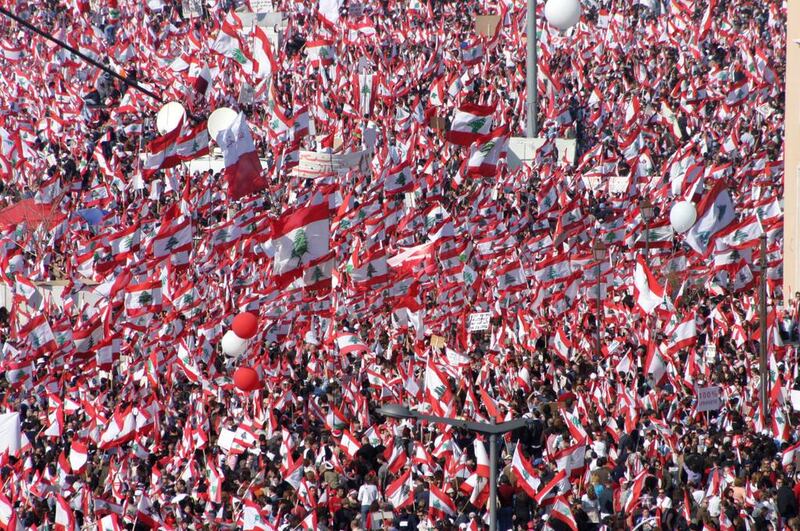For those who haven’t been paying attention, most of the conflicts in the Middle East today are the fault of one group. Whatever names spring to mind – and they usually begin with I: Iran, Israel or Islamists – you are wrong, according to Joseph Massad, professor of modern Arab politics at Columbia University.
“The most dangerous and destructive political force in the post-1967 Arab world,” he writes, has been Arab liberals. That will come as a surprise to many who have long wished for more, not less, liberalism in the region.
Mr Massad made the claim in an essay two weeks ago, called “The destructive legacy of Arab liberals”. He argued that it was Arab liberals, birthed or funded by the West, who have argued for every major military intervention in the region since the 1960s.
For Mr Massad, this isn’t merely a historical argument. He argues that right up until the present day, particularly before and during the Arab Spring, it was the liberals who called for and justified the destruction that followed.
“Arab liberals helped bring about and justify such massive levels of destruction across the Arab world. [They] cheered Nato intervention in Libya ... and in Syria. These levels of destruction are unprecedented in scope even in colonial times”.
Some background is useful. Mr Massad’s most recent book, Islam in Liberalism, is a fascinating argument situating Islam as part of the broader history of liberalism around the world, and placing it in the context of European power.
His argument in the book is that without Europe’s conception of what “Islam” was and is, European liberalism could not exist. Islam is the other that allows Europe to believe sincerely that its version of liberal ideology is correct. It is out of that book that this argument comes.
All of which makes Mr Massad’s article more surprising. Because apart from never defining “liberals”, he also ignores the long history of Arab liberalism, as if the tradition sprung fully-formed in the 1960s.
But the real problem with Mr Massad’s thesis is that he sees similarities between various Arab conflicts, but doesn’t ask how those conflicts might look to those involved. Two wars might look very similar from the air but rather different on the ground.
Take two recent conflicts, the Iraq invasion of 2003 and the Syrian civil war. For Mr Massad, both have their roots in the cheerleading of Arab liberals.
Iraqi liberals, he writes, called for “an imperial invasion” of Iraq in the aftermath of the 1991 war and the 2003 invasion “finally granted the liberals’ wish”.
It was certainly true that there were Iraqi voices outside Iraq calling for the end of the Saddam Hussein regime (rather fewer, of course, inside Iraq), but even if one accepts the basic premise of the argument, Mr Massad confuses correlation with causation.
The Iraqis who wished for an invasion got their wish, but it wasn’t their wish that caused the invasion. Remember that it wasn’t only Iraqis in exile who called for the toppling of Saddam. Many other conservative US voices also called for it, and their voices rang rather louder in Washington’s corridors of power.
And look at the opposition: millions opposed the war, Arabs, Europeans and Asians, and none of it mattered. The idea, which Massad seems to believe, that war-planners in Washington simply listened to Iraqi liberals and launched an invasion is fanciful. It vastly overstates their power and implies that had they said something different – say, don’t destroy the country for no reason – they would have been listened to.
The same applies to Syria. Mr Massad has been attacked for his views on Syria. He famously blamed US imperialism for the brutal turn that the Syrian civil war took during 2011. For Mr Massad, “Syrian liberals called for imperial intervention” and “got what they wished for” with ISIL.
This is not merely a mistaken view of the causes of the Syrian civil war; it is also profoundly unfair towards the hundreds of thousands of Syrians who genuinely wished for better days in early 2011 and ended up calling for outside intervention to save them from the bullets and the barrel bombs of the Assad regime.
It wasn’t Syrian liberals who wished for imperial intervention, they wished for an end to the Assad regime and only when the massacres and castrations and the rape squads and the mass graves began, did they seek outside help.
That’s the fundamental problem with Mr Massad’s attribution of blame. He affords Arab liberals power only when they cheerlead imperial adventures. If Arab liberals were as powerful as he says throughout the latter half of the 20th century, there should at least be other accomplishments to point to, and even criticise, than mere interventions.
Mr Massad wants us to believe this is because all Arab liberals have done is call for western violence in the Middle East. It is more likely that the violence would have happened anyway, regardless of what Arab liberals said.
falyafai@thenational.ae
On Twitter: @FaisalAlYafai





